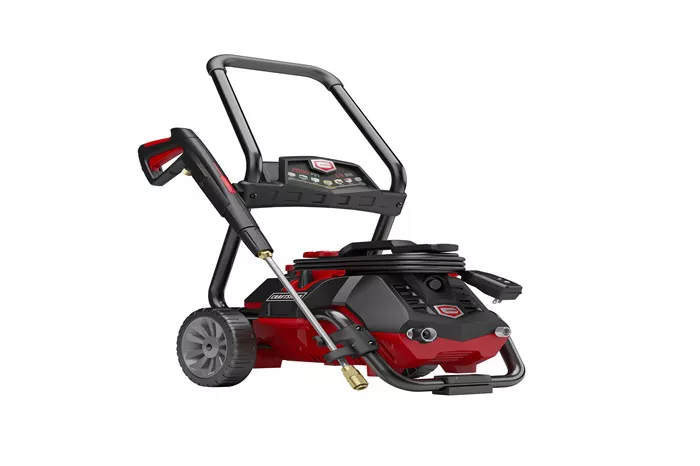What Is A Craftsman Power Washer?
A Craftsman power washer can be a powerful tool for cleaning a wide range of surfaces, from driveways and decks to vehicles and outdoor furniture. However, to ensure the machine operates safely and efficiently, it’s crucial to follow the proper startup procedures. Whether you’re using a gas-powered or electric model, taking the time to prepare the equipment before use can help prevent damage, improve performance, and keep you safe during operation. This guide will walk you through the necessary steps for starting your Craftsman power washer.
Preparation
Assemble the Power Washer
If you have a new Craftsman power washer or one that hasn’t been used in a while, the first step is to assemble the unit. Refer to the user manual for specific instructions, but generally, this includes attaching the handle, the spray gun, and the high-pressure hose to the unit. Make sure all connections are tight and secure to prevent any leaks or mishaps during use.
Connect the Water Supply
Next, you’ll need to connect a garden hose to the power washer’s water inlet. Ensure the hose is securely attached to both the power washer and the water source. Check for any leaks or kinks in the hose, as these could reduce the water flow and affect the performance of the power washer.
Check Fuel Levels (For Gas-Powered Models)
For gas-powered models, it’s essential to check the fuel levels before starting. Ensure the tank has enough fuel for the job at hand. Use only the recommended fuel type and avoid using old fuel, as this could cause the engine to run poorly. If the tank is empty or low, refill it with fresh fuel.
Starting the Engine
Turn On the Power Washer
Locate the engine switch or ignition switch on the power washer. Turn the switch to the “on” position to activate the machine. For electric models, you may need to plug the power cord into a nearby outlet.
Pull the Starter Cord (For Gas Models)
For gas-powered models, pull the starter cord firmly and quickly. You may need to pull it a few times until the engine starts. If you experience difficulty starting the engine, ensure the choke and fuel valve are correctly set (more on this below).
Use the Electric Starter (For Electric Models)
For electric models, the process is simpler. Press the electric starter button, which is usually located near the power switch or on the handle. The motor should begin running once the button is pressed.
Adjust Settings
Choke and Fuel Valve
If you’re using a gas-powered model, the choke and fuel valve must be adjusted depending on the engine’s temperature. If the engine is cold, pull the choke lever out to help start the engine. Once the engine is running, gradually push the choke back in to allow the engine to warm up. If the engine is warm, you can typically leave the choke in the “off” position.
Choose the Nozzle
Select the appropriate nozzle for the task at hand. Craftsman power washers typically come with multiple nozzles, each designed for different cleaning tasks. For example, a 0° nozzle offers a high-pressure stream for tough stains, while a 40° nozzle is better for delicate surfaces or rinsing. Attach the chosen nozzle securely to the spray gun before turning on the water.
Operation
Engage the Trigger
Once the machine is running and the nozzle is in place, engage the trigger on the spray gun to start the water flow. Aim the nozzle at the surface you wish to clean, and maintain a safe distance to prevent damaging the material.
Adjust Pressure
Most Craftsman power washers come with a throttle lever or dial to adjust the water pressure. If you need more force, increase the pressure. For delicate surfaces or areas that require less pressure, decrease the setting to avoid causing any damage.
Troubleshooting
Common Issues
While starting your Craftsman power washer, you might encounter common issues such as:
The engine not starting: This could be due to an empty fuel tank, a clogged spark plug, or improper choke settings.
Engine sputtering or stalling: This often occurs if the fuel is old, the fuel line is clogged, or there’s an issue with the carburetor.
Lack of pressure: If the power washer isn’t producing enough pressure, check for blockages in the nozzle or hose and ensure the water supply is adequate.
Spark Plug and Carburetor
To address issues like sputtering or difficulty starting, check the spark plug for dirt or wear. Clean or replace it if necessary. Similarly, ensure the carburetor is clean and free from debris, as this can affect fuel flow and engine performance. Refer to the user manual for instructions on maintaining and cleaning these components.
Conclusion
Starting a Craftsman power washer may seem simple, but following the correct steps is essential for safety and optimal performance. From assembling the unit and connecting the water supply to adjusting the choke and fuel valve, each step plays a role in ensuring the machine runs smoothly. Remember to consult your user manual for any model-specific instructions, and always adhere to safety guidelines to prevent accidents. Regular maintenance and proper startup procedures will help extend the life of your power washer and keep it functioning efficiently for years to come.
Related topics:
- 5 Best Power Tools for Professional and DIY Use
- The 3 Oldest Power Tool Brands
- Who Owns Bosch Power Tools?

